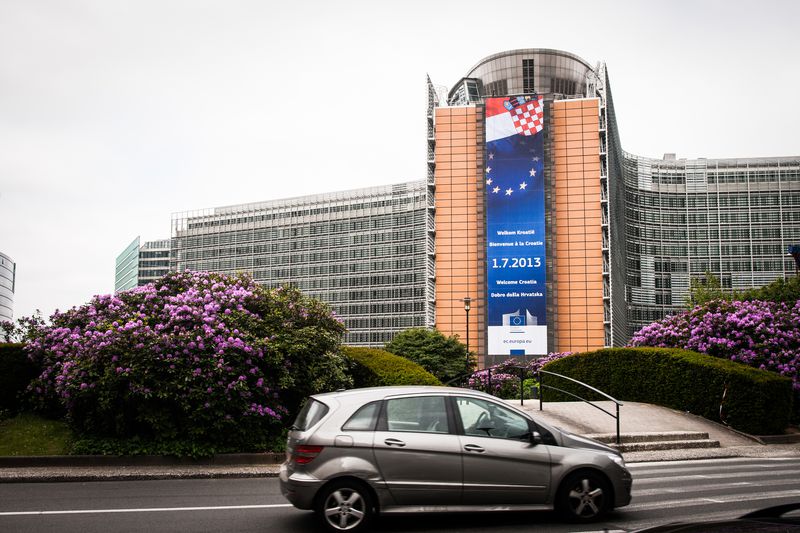Does EU Take a Risk with Croatia as It Did with Bulgaria and Romania in 2007?
Tomas Lundin, June 13, 2013
 Tomas Lundin, a journalist with the Swedish daily Svenska Dagbladet, published an analysis [in Swedish] about the upcoming accession of Croatia in the EU on July 1st. "In less than a month, Croatia will be the new member of the EU. Does the EU risk the mistakes from 2007 to be repeated when the door was opened for the corruption-eaten Romania and Bulgaria?", the journalist asks. We are offering you herewith a translation of Tomas Lundin's article:
Tomas Lundin, a journalist with the Swedish daily Svenska Dagbladet, published an analysis [in Swedish] about the upcoming accession of Croatia in the EU on July 1st. "In less than a month, Croatia will be the new member of the EU. Does the EU risk the mistakes from 2007 to be repeated when the door was opened for the corruption-eaten Romania and Bulgaria?", the journalist asks. We are offering you herewith a translation of Tomas Lundin's article:
Many had fears when Romania and Bulgaria were accepted in the European Union. In a report after report, the EU experts pointed to the widespread (endemic) corruption, the weak judiciary and the obvious deficiencies of the fight with the organised crime. Today, five years later, Romania and Bulgaria are still under the monitoring of the European Commission, known as a Cooperation and Verification Mechanism, which in a limited period of time must ensure that the future members quickly raise up to the EU standards. Croatia, too, is fighting corruption and organised crime, more specifically the traffic of people. But still, the new members of the EU are in a better position to merge into the Union. The reasons why we should not be too worried are the following:
1. EU HAS LEARNT ITS LESSON. Instead of moving on to fast reforms after accession, Croatia was forced to fulfil almost all of its commitments before that. The principle 'check is the highest form of confidence' was followed. A critical report by the EU last autumn forced the government in Zagreb to raise the tempo and now it is intensively working on responding to all the requirements before July 1st. Karin Anderman, counsellor in the embassy of Sweden in Zagreb, responsible for the EU policy, says that the judiciary is improved and the fight with corruption has been enhanced, although it is the corruption that still is a challenge.
2. A GAP IN THE WELFARE SYSTEM. BULGARIA AND ROMANIA BELONG TO THE POOREST MEMBERS. IN BULAGRIA THE INCOMES ARE 1/3 OF THE EU AVERAGE. ALMOST 1/4 OF THE HOUSEHOLDS LIVE UNDER THE OFFICIAL LINE OF POVERTY WITH AROUND 1 000 CROWNS.
The growing migration due to poverty to the big Western European cities, often organised by crime gangs, is one of the consequences. The beggars in the streets are the most visible sign, as well as the skyrocketing social spending that forced many municipalities, especially in Germany and France, to warn of a forthcoming budgetary crisis and to demand stricter border control. But Croatia belongs to the most prosperous countries in former Yugoslavia with levels of payment almost double to those in Bulgaria, although outside the touristic resorts along the coastline it is easy to find financial and social misery. Nonetheless, a warning flag should noty be waved.
3. THE BALKANS - A POWDER KEG. Since the end of 1990, Croatia has walked a long way from aggressive nationalism to reconciliation with Serbia and Bosnia and Herzegovina. During an official visit in Sarajevo three years ago, President Ivo Josipovic apologised for the Croatian war crimes during the war which the Croats call an independence war (1991-1995), mainly the war with Bosnia that cost the lives of around 100 000 people. The process of reconciliation is due to the negotiations with the EU. Now, we can hope that this will be an example for Serbia which hopes to get a green light for accession negotiations soon, says Gerald Knaus, chairman of the European Stability Initiative, a think tank.
And yet, the EU is opening for the membership of a country with serious problems. First, it is the economy which needs structural reforms and competitiveness, the youth unemployment is around 50% and there is an unhealthy dependence on tourism.
 Kolinda Grabar-Kitarovic | © KGK
Kolinda Grabar-Kitarovic | © KGK Jozo Rados | © European Parliament
Jozo Rados | © European Parliament Aleksandar Vucic, Andrej Plenkovic | © Vlada RH
Aleksandar Vucic, Andrej Plenkovic | © Vlada RH